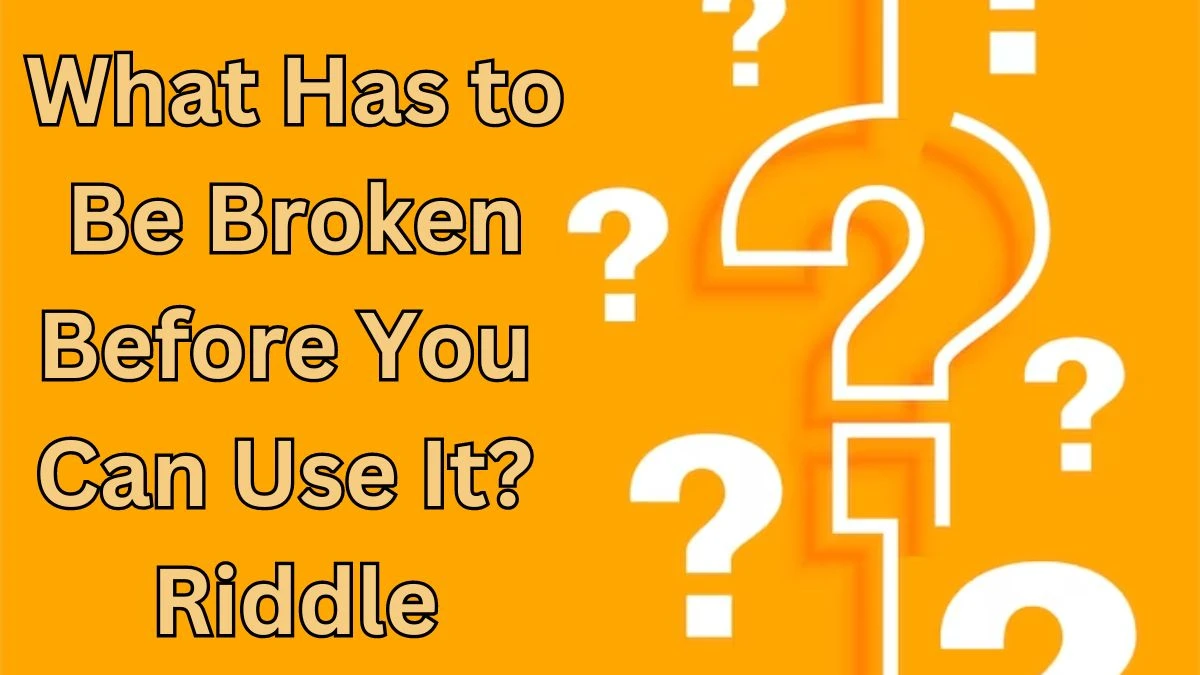- Rojgarlive »
- Riddle »
- What Has to Be Broken Before You Can Use It? Riddle and Answer
What Has to Be Broken Before You Can Use It? Riddle and Answer
by S Samayanka
Updated Feb 23, 2024

What Has to Be Broken Before You Can Use It? Riddle
Can you guess what needs to be broken before it can be used? There are many possibilities, but the real answer is quite obvious. It's something we encounter every day and often take for granted. When you figure it out, it might seem simple, yet it holds a profound truth about the nature of using certain objects.
It's a common item found in many households, and its usefulness only becomes apparent once it's broken. Think about the things you use regularly, and you might just stumble upon the answer. So, take a moment, ponder, and see if you can crack the riddle.
Riddle: What Has to Be Broken Before You Can Use It?
What Has to Be Broken Before You Can Use It? Riddle Answer
This riddle asks what must be broken before it can be used, and the answer is an egg. Eggs must be cracked open before their contents can be utilized in cooking. This answer seems obvious once you think about it, but it also carries a deeper meaning about the necessity of breaking something to access its usefulness.
The shell of the egg acts as a barrier, and breaking it is essential to accessing the nutritious and versatile contents inside. This riddle serves as a simple yet profound reminder that sometimes, breaking something is the first step towards making the most of its potential. It's a playful way to highlight the importance of overcoming obstacles to achieve desired outcomes in various aspects of life.
Answer: Egg
What is Riddle?
A riddle is a form of enigmatic expression that challenges the intellect and encourages creative thinking. It typically presents a puzzling question or problem, often in a metaphorical or allegorical manner, with the goal of teasing out a clever and unexpected answer.
Riddles have been an integral part of human cultures throughout history, serving as a source of entertainment, mental stimulation, and sometimes even educational tools. They exist in various forms, from verbal puzzles to written or visual conundrums. Riddles often require lateral thinking, as they demand individuals to approach problems from unconventional angles to arrive at a solution.
In essence, a riddle is a playful and imaginative exercise that invites individuals to engage their cognitive abilities, fostering a sense of curiosity and the joy of unraveling mysteries. Whether used for amusement, social interaction, or intellectual development, riddles endure as timeless expressions of human ingenuity and the universal desire for mental challenges.
Benefits of Solving Riddle
- Mental Exercise: Engaging with riddles provides a mental workout, enhancing cognitive abilities and boosting critical thinking and problem-solving skills.
- Language Development: Riddles, often filled with wordplay and clever language usage, contribute to the enrichment of vocabulary. Regular exposure improves linguistic creativity and proficiency.
- Cultivation of Creativity: The process of unraveling riddles encourages thinking outside conventional boundaries, fostering creativity and imaginative thinking.
- Entertainment and Social Interaction: Solving riddles is an enjoyable activity, offering entertainment and amusement. It can be a social experience, promoting interaction and friendly competition.
- Educational Insights: Riddles often convey cultural or historical insights, serving as a playful means to learn about language, traditions, and societal aspects. They can be incorporated into educational settings for engaging learning.
- Confidence Building: Successfully solving challenging riddles instills a sense of accomplishment, boosting self-confidence, and encouraging perseverance when faced with mental challenges.
- Memory Enhancement: Recalling information from riddles contributes to memory improvement. The mental effort involved in solving them strengthens memory retention.
- Logical Reasoning Development: Riddles typically follow a logical structure, guiding individuals through a sequence of thoughts or deductions. This aids in the development of logical reasoning skills.
What Has to Be Broken Before You Can Use It? Riddle - FAQs
A riddle is a puzzling question or problem that challenges the intellect, often with a metaphorical or allegorical presentation, aiming to elicit a clever and unexpected answer.
Riddles provide mental exercise, language development, cultivate creativity, offer entertainment and social interaction, and convey educational insights.
Mental exercise, language development, creativity cultivation, entertainment, educational insights, confidence building, memory enhancement, and logical reasoning development.
The answer is an egg.
Riddles have been an integral part of human cultures throughout history, serving as sources of entertainment, mental stimulation, and sometimes even educational tools, fostering creativity and curiosity.




